Natural Spider Repellent: 9 Safe Spider Deterrents for Your Home & Yard
Author: Jen Worst | Editor: Omar Alonso
Review & Research: Jen Worst & Chris Miller
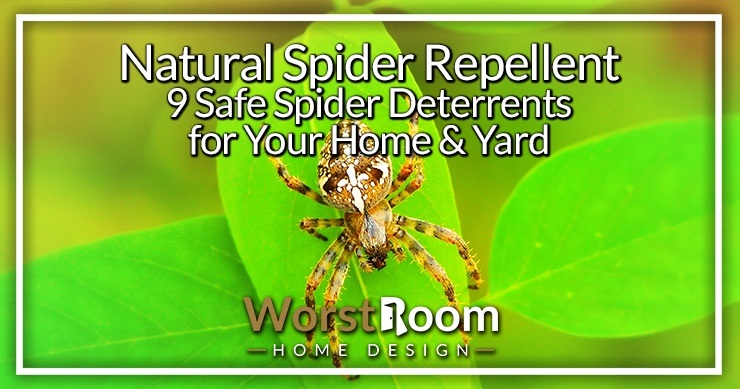
There are certain times of the year that the spiders go crazy spinning their webs, and no, I don’t mean around Halloween. I understand these critters contribute to the natural order of things, especially in my garden.
However, I get tired of chasing them off my front door and wiping webs off of my porch light.
Of course, I'm not interested in harming them, only in encouraging them to make their nests someplace other than around and inside my house. So I did some investigation on natural spider repellent to see what I could do without pesticides.
Below are nine repellents that are natural and safe (if used correctly) as well as some tips to keep these creepy crawlies out of your home.
9 Natural Spider Repellents
In my searches on how to get rid of spiders naturally, I came across some simple, yet effective, methods that I could start using immediately. Some work as spider deterrents, while others will cause their demise. You’ll have to decide which way will work best in your particular situation.
Herbs & Essential Oils
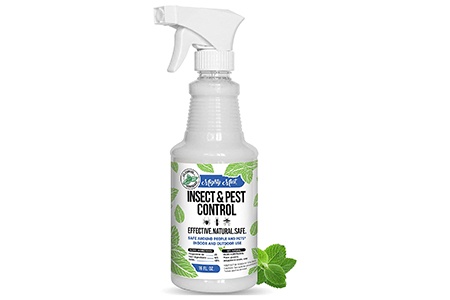
There are a variety of herbs and essential oils that spiders don’t like. You can make up small sachets of these herbs and hang them in the most spider prone areas. Or you could mix up a batch of spider spray essential oil repellent (pre-mixed as seen in the image above) to spritz in corners and under beds.
The best part of these natural spider repellents is that they end up making your house smell minty fresh in addition to encouraging those unwanted 8-legged guests to leave.
Studies have shown that sandalwood and mint oil work the best in repelling spiders. They have a natural aversion to these smells.
Although lemon oil has been touted as another herbal treatment for arachnids, scientific studies have found that it doesn’t work as a spider deterrent. On the other hand, it does leave your house lemony fresh.
Diatomaceous Earth
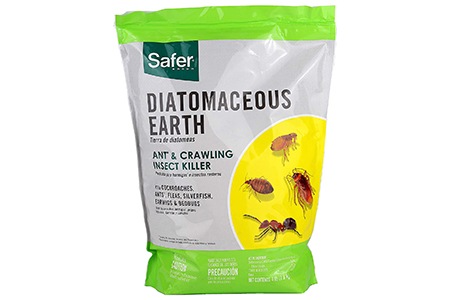
Diatomaceous earth is a type of soft sedimentary rock that is made up of fossilized remains of diatoms. Diatoms were prehistoric hard-shelled organisms. When finely milled into a powder, it can be used as an insecticide.
It works by absorbing the lipids from the exoskeleton of spiders and other insects. Without this outer layer, the spider dries out and dies.
Use diatomaceous earth by dusting crevices, corners, crawl spaces, and the spaces under beds and other furniture. Don’t use too much, or spiders will avoid the area.
Reapply the diatomaceous earth to the affected regions after vacuuming. Diatomaceous earth is also effective against carpenter ants, centipedes, and cockroaches.
Even though diatomaceous earth is a naturally found substance, breathing in these particles can be dangerous to your health, so always use a mask when applying it.
Plants that Repel Spiders

Which are the plants that repel spiders? Any of the plants in the mint family (Lamiaceae) are fabulous natural spider repellents whether you use them as essential oils or grow the whole plant.
Mint plants include catnip, lavender, lemon balm, peppermint, spearmint, basil, marjoram, all types of oregano, rosemary, sage, and thyme, among others. Most of these are plants that repel ticks too.
To discourage spider webbing, pick up a few potted plants and grow them in those corners spiders love. Mint is a good choice that smells great (seen above).
As a bonus, not only will you have a lovely spider deterrent, you’ll have fresh, organic leaves for sachets, teas, or cooking at your fingertips. You can apply neem oil if any other insects decide to move in and make your plants their home.
Air Freshener Spider Repellent
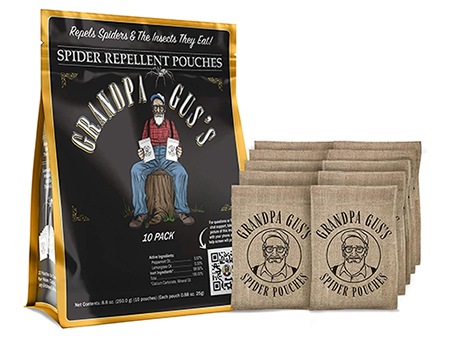
There are some commercially produced air freshener spider repellents. However, they may not be as effective as the one you make yourself. Some of the ingredients, while they smell sweet, might not deter spiders as much as you’d like.
For example, citronella oil and eucalyptus scents are effective when used as a mosquito repellent. Unfortunately, there is no evidence that they work against spiders, despite the marketing saying otherwise.
So if you want to make an air freshener spider deterrent, you would be better off using mint plants. It’s easy enough to pick up some essential oil at the health food store, or even distill your own.
Add a few drops to your diffuser and saturate the area with a fresh minty scent that spiders would wrinkle their noses at, that is, if they had noses. Spiders smell and taste through specialized sensory organs on their legs.
Sticky Traps
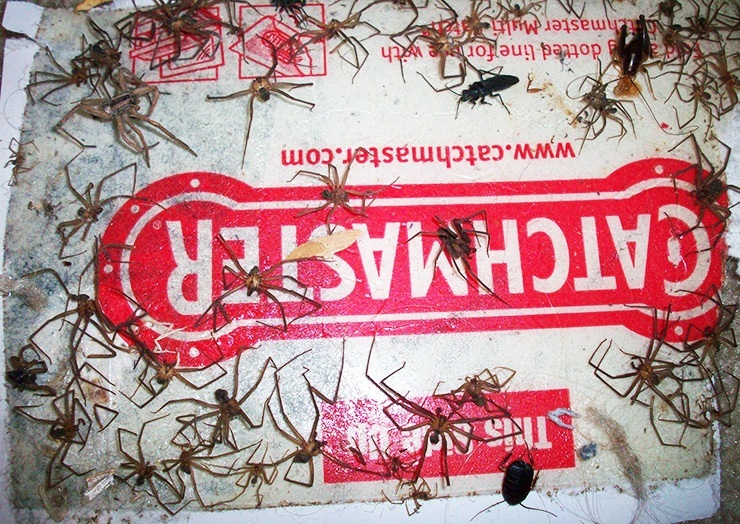
Sticky traps will capture any spider unfortunate enough to come in contact with it. Unlike the spider vacuum, spiders in a sticky trap won’t be able to be released into the wild, sadly.
So this is more of a spider exterminator rather than repellent. However, they are non-toxic and can safely be used around pets and children.
Spider Vacuum

You might consider adding a spider vacuum to your cleaning supplies if spiders or other creepy crawlies are abundant in your domicile. A spider vacuum is a battery-operated low-suction vacuum that will suck those buggers up without harming them.
Once you’ve captured those arachnids, cap the tube. Take the spider vacuum outside and release them somewhere far from your home and garden.
Tobacco Spray in Your Yard
Tobacco works in a round-about way to reduce the spider population in your yard. The tobacco plant functions as a natural pesticide. Spider food, like flies, moths, mosquitoes, and other bugs, avoid areas with tobacco scents.
Spiders find those areas have no food and move on to greener pastures. You can make an insect-repelling tobacco spray with loose leaves and water and mist the perimeter of your yard with it.
Chestnuts
Chestnuts are amazingly effective in keeping spiders from moving into an area. So go ahead and enjoy the scent of chestnuts roasting in an open fire, knowing that spiders won’t.

Chestnuts can be placed under beds, along windowsills and other entry areas to discourage those critters from setting up a home in your home. Because of the size of these nuts, they are a choking hazard for pets and small animals, so be sure to place them out of reach.
If you live in an area where spiders are a constant issue for you, you could even consider growing a few types of chestnut trees (you can keep them small) to harvest your own flow of fresh chestnuts to use. You can store the excess chestnuts for use all year.
Saltwater
Saltwater works similarly to diatomaceous earth in that direct contact dries out and kills spiders. Spritzing a spider and its web with salt water will most likely cause its demise. That leaves you free to clear away the cobwebs and dead spiders.
Dangers of Conventional Spider Pesticides
Conventional spider pesticides will certainly kill spiders. However, there are health risks to using most bug spray (like DEET). The most common spray pesticide ingredients are cyfluthrin, bifenthrin, deltamethrin, and lambda-cyhalothrin.
These chemicals have been shown to cause neurological damage to humans. This is similarly why you shouldn't use Windex to kill spiders, though it works. You don't want to spray chemicals indiscriminately around your home, inside or out.
Silica gel, cyfluthrin, and deltamethrin are common chemicals found in powdered insecticides. Exposure to these chemicals increases your risk of developing neurodegenerative disorders like Alzheimer’s and Parkinson’s.
Pests, including spiders, develop a resistance to these chemicals over time, which means higher doses must be applied to eliminate the infestations.
Higher quantities of these chemical compounds subsequently increase the health risks to any humans, pets, and beneficial insects living in an area that has been treated.
5 Tips for Keeping Spiders Out of Your Home
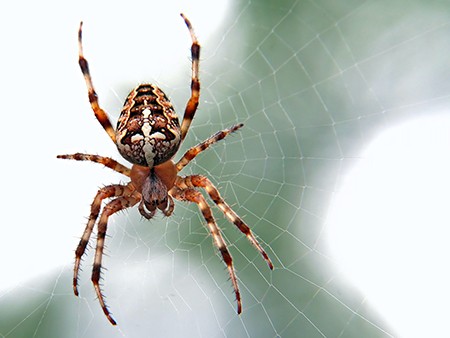
With very few exceptions, spiders are harmless creatures. They won’t bother you if you don't bother them. However, if you aren’t comfortable sharing your home with them, there are a few home spider control tasks you can do to discourage them from moving in.
1. Seal Gaps at Ground Level
Spiders slip in under doors and between window cracks. Installing window screens and sealing any window gaps will reduce the number of spiders that get in. The addition of a door sweep will keep spiders and other outside bugs from coming in under the door.
2. Regular House Cleaning of Webs & Sacs
Regular house cleaning is one of the best ways to eliminate spiders. A spider vacuum or any types of brooms will quickly and efficiently remove spiders, webs, and egg sacs.
Be sure not to leave any egg sacs behind since each one can contain lots of baby spiders. Some female spiders can lay up to 3,000 eggs at one time.
3. Remove Items Spiders Use as Breeding Grounds
Spiders often hang out in stacks of firewood and other piled junk that isn’t moved too often. Shifting these items away from the house will encourage spiders to find a different location to gather.
Shrubs, tree limbs, and vines can serve as a convenient bridge for arachnids. Remove as many of these superhighways around your home as possible.
4. Leave the Lights Off at Night
Insects are attracted to lights, which in turn attract spiders who feed on these insects. Turning your lights off at night will discourage insects and thus spiders.
Yellow or sodium vapor lights are less attractive to insects than conventional lights. If you must have a light on at night, consider installing one of these instead.
5. Recycle & Remove Clutter
Spiders don’t like a lot of commotion. They prefer quiet, low traffic areas with lots of hiding spaces like the garage, basements, closets, and attics. Clearing out these areas will go a long way in reducing the spider population in them.
Take piles of newspapers, empty boxes and bottles to the recycling bin regularly to keep spiders from setting up house.
Overcoming Arachnophobia, the Fear of Spiders
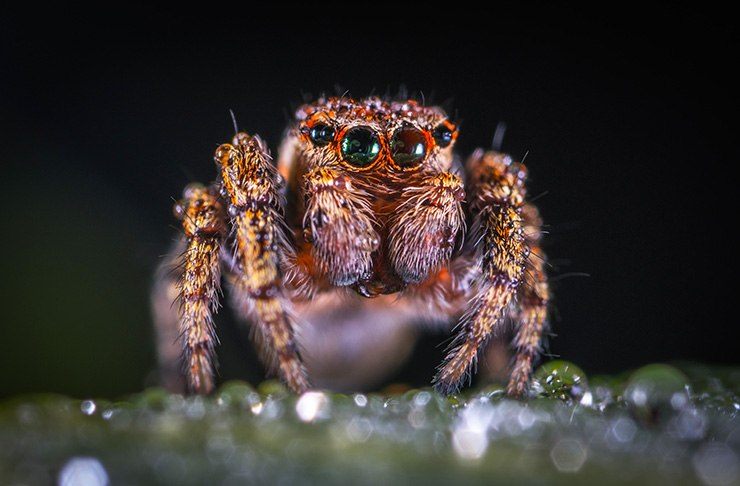
Of 43,000 different species of spiders found worldwide, only 30 pose any danger to humans. Yet 5 out of every 100 people in the United States are afraid of these useful creatures.
Arachnophobia is an extreme or irrational fear of spiders and can be a debilitating condition. Phobias are learned responses and can be unlearned through patience and more understanding of the beneficial aspects of spiders.
Positives of Having Spiders Around
Let’s take a look at some of the benefits spiders provide (try to convince yourself of the truth of these so you release some of your fear).
Agricultural Benefits
Spiders reduce the amount of human food eaten by pest populations like aphids and caterpillars. Unfortunately, commercial pesticide use has decreased the spider population in agricultural settings.
Now farmers are forced to use yet more chemicals to combat those pests that spiders usually would take care of. More pesticides on the food that we eat isn’t healthy for anyone, insect or human.
Pest Control
Spiders are predators. They eat insects, spiders, and even mice. They love to feed on disease-carrying pests like cockroaches, earwigs, mosquitos, clothes moths, and flies.
These pests can wreak havoc in your home, not to mention your health if they are left unchecked. Meanwhile, no one has ever gotten dengue or malaria from a spider.
Spiders’ Role in the Food Chain
Spiders not only eat pests but in turn, are eaten by birds, lizards, wasps, and other animals, thus contributing to the larger cycle of life. Humans, whether they admit it or not, are part of that life chain. We need spiders for a functional ecosystem. You don't need them to get rid of insects, though. You can get rid of wasps with vinegar, as an example. Don't trade one problematic bug for another.
We Use Spider Resources
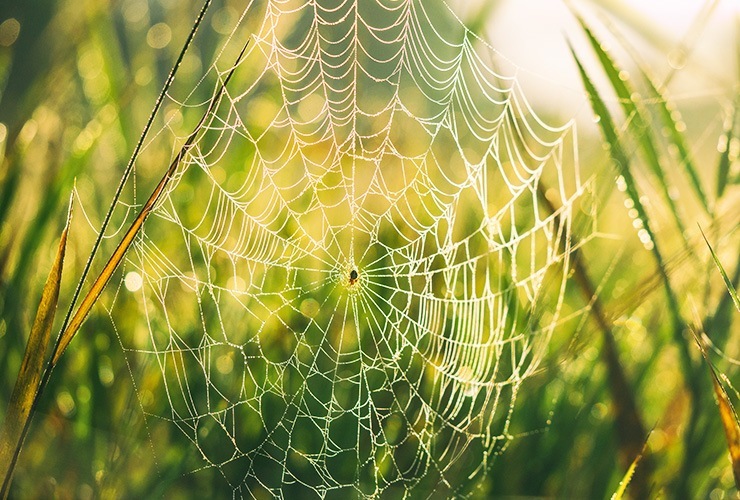
Did you know that spider silk is used by birds in nest building, especially among the passerine and hummingbird species? Humans also use spider resources.
The scientific study of spider silk has led to the development of super-strong fibers used in products like parachutes.
The pharmaceutical properties in spider venom have been used in several effective medicines for neurodegenerative diseases. Spiders are useful creatures to have around.
They’re Ancient
It is believed that spiders evolved nearly 400 million years ago, more than 150 million years before the dinosaurs. Spiders are found on every continent except Antarctica.
They have evolved to meet the changing times. They may very likely outlive humans if we don’t send them the way of the Dodo with our never-ending quest for extermination.
Natural Spider Repellent Benefits Everyone
There is no reason why spiders and humans can’t co-exist on earth. That doesn’t mean you need to share your intimate living space with heaps of these 8-legged creatures.
Spiders have their place in the grand scheme of things and can do what they do best, catch insects, outside of your home.
The application of natural spider repellents rather than chemical pesticides benefits everyone. Methods such as using mint plants as a deterrent or removing spiders gently in a spider vacuum are more spider-friendly.
They benefit the spider since it can live to weave another web (in another place) on another day. Allowing the spider to live and catch those pesky, disease-carrying insects, benefits you as well.
Learning how to get rid of spiders naturally should be one of your priorities as a homeowner. Toxic insecticides might seem more straightforward.
However, the danger they present to the health of your pets and your family far outweigh any perceived benefit in their use. Be safe out there, folks!



